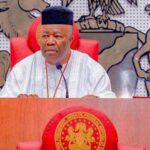Professor of Capital Market, Uche Uwaleke has weighed in on the 2024 budget recently presented by President Bola Tinubu, saying while the proposal holds a lot of promise for the economy if well implemented, the exchange rate parameter might be unrealistic.
According to him, the N750 to the dollar rate used for the 2024 budget was “a tall order.”
Tinubu had last week presented a budget estimate of N27.5 trillion with several parameters including an exchange rate of N750/$.
Uwaleke stated that a naira float in the face of weak supply and strong demand with its attendant forex market volatility introduces uncertainty in budget implementation.
- 3 months after, no clue on whereabouts of abducted Zamfara varsity students
- APC wins all seats in Ekiti LG polls
He said, “It’s most likely the exchange rate that will be the major cause of wide budget variances in the 2024 budget on account of NAFEM operations.
“This is particularly so in respect of the dollar-denominated component of the budget much of which can be found in the over N3 trillion proposed defence spending as well as in recurrent debt expenditure.
“A volatile and high exchange rate will increase the cost of servicing external debt and further widen the budget deficit.
“In my view, a well-implemented and corrupt-free dual (not multiple) exchange rate regime (one official including for debt service and another tier for other transactions) helps to bring certainty in government procurements and short-term planning in general.”
He also pointed out that the mode of financing the over N9 trillion deficit could have an impact on the cost of capital for firms and the stock market.
“Unlike in previous budgets where the amount voted for new borrowings was split fairly equally between domestic and foreign sources, this time around domestic borrowing is taking up a huge chunk at about 78% (N6.1 trillion out N7.8 trillion provisioned for new borrowings)
“This can have the effect of crowding out the private sector, hiking interest rates, increasing the cost of funds and depressing the equities market as investors migrate to fixed-income securities. The outcome will be a further weakening of the productive sector,” he added.
The expert advised the government to explore more opportunities for concessional project-tied loans from multilateral and bilateral sources.

 Join Daily Trust WhatsApp Community For Quick Access To News and Happenings Around You.
Join Daily Trust WhatsApp Community For Quick Access To News and Happenings Around You.


